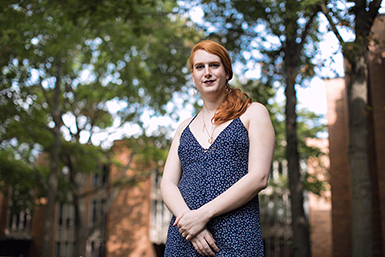
Florence Ashley is a SJD student in the Faculty of Law and Joint Centre for Bioethics (photo Dewey Chang Photography)
A new paper published today in Bioethics proposes Research Ethics Boards consider the impact of research fatigue when evaluating and approving studies.
“Research fatigue is this emotional and psychological exhaustion with regards to and as a result from engagement in research,” says Florence Ashley, a University of Toronto doctoral student in the Faculty of Law and the Dalla Lana School of Public Health's Joint Centre for Bioethics. According to the author, it results from the large quantity and poor quality of studies on marginalized research population and is aggravated by factors such as distressing questions or lack of familiarity with language used by a community.
“It’s topic specific in the same way that occupational burnout is. You might have energy to do non-employment [related tasks] but still have occupational burnout.”
Ashley says research fatigue can have an impact on participant psychological, emotional health outside the research context, but it has major impacts in the research context itself, because it prevents participation in future research.
“I've experienced it and I've seen so many friends experience it.”
Ashley, an instructor for “Introduction to Trans Studies” at U of T’s Mark S. Bonham Centre for Sexual Diversity Studies, says studies ought to be shaped in ways that lead to less research fatigue and promote social justice, which would in turn allow marginalized communities to make use of the research to promote their own equality.
“There's a broader social justice issue at play, especially in cases where the research fatigue is arising from bad research [design] and not responding to the needs of the community.”
Ashley says study participants can be given tools to ensure the study aligns with the participant’s values before they decide whether to participate.
“A multifaceted approach. Engaging in more collaborative research methodologies, like community-based participatory research; having members of communities as primary or co-primary investigators; and in higher positions in research projects. To start thinking about the issue research ethics [in] every step in the process.”
Ashley says, as part of finding value in study participation, is for researchers to communicate the results to study participants in an accessible way. They point to the Trans PULSE study, which illustrated the results in short two-pagers and infographics. They suggest explaining “‘here’s why it matters’ in clear and understandable language that trans people can take use in advocating for themselves.”
For their graduate work, Ashley is investigating clinical approaches to trans care from both a bioethics and legal perspective. In their master's of law thesis at McGill University, Ashley explored the legal regulation of conversion therapy. They recently gave expert testimony at Québec’s National Assembly on Bill 70, An Act to protect persons from conversion therapy provided to change their sexual orientation, gender identity or gender expression.
Given their research interest in transgender health, Ashley, as a trans researcher, who has also participated in trans community studies, says it can be difficult to find enough participants to make a study viable.
“You’re putting stress on a marginalized group at a psychological level, but also at a community level.”
They cite, with much admiration, Professor Eve Tuck, an associate professor of Critical Race and Indigenous Studies at U of T's Ontario Institute for Studies in Education (OISE) for defending refusing research when the project would perpetuate oppression. Ashley says the refusal to engage in such research is a rational response.
Research Ethics Boards, says Ashley, ought to take into account research fatigue in such way that not only lessens research fatigue, but approve and evaluate studies that promote a healthy, scientific ecosystem that can continue to produce – contribute to – high-quality, high-social value research that help marginalized communities.
“Taking the research projects that are already there and improving them to produce as little research fatigue as possible. What are you doing? Why are you doing it? Is this the right thing to be doing?”
Ashley says it’s a new spin, not a radical reinvention, to keep research fatigue top of mind.
“What we might call research quality but is more precise to call research responsiveness."

